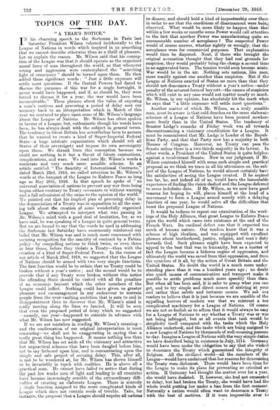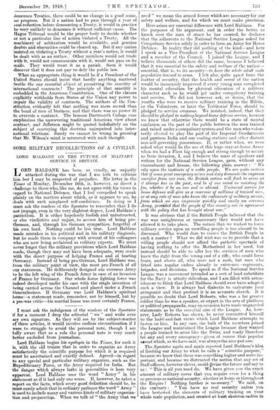TOPICS OF THE DAY.
"A YEAR'S NOTICE."
TN his charming speech to the Sorbonne in Paris last Saturday President Wilaon referred incidentally to the League of Nations in words which inspired in us something that we cannot describe otherwise than as a thrill of pleasure. Let us explain the reason. Mr. Wilson said that his concep- tion of the League was that it should operate as the organized moral force of man throughout the world, so that whenever wrong and aggression were contemplated the "searching light of conscience" should be turned upon them. He then added these significant words : "Just a little exposure will settle most questions. If the Central Powers had dared to discuss the purposes of this war for a single fortnight, it never would have happened, and if, as should be, they were forced to discuss it for a year, the war would have been inconceivable." These phrases about the value of exposing a man's motives and procuring a period of delay sent our memory back to an interpretation which in March of this year we ventured to place upon some of Mr. Wilson's language about the League of Nations. Mr. Wilson has often spoken in favour of a League, but, enthusiastic though his words have been, he has always dealt with the subject in general terms. The tendency in Great Britain has nevertheless been to assume that he wanted to create a kind of Super-Imperial Federal State--a huge intricate organization which should rob all States of their sovereignty and impose its own sovereignty upon them. We shrank from this conception because we could see nothing in it but a threat of future contentions, complications, and wars. We read into Mr. Wilson's words a moderate and very much more sensible scheme. In an article entitled "The Sanctity of International Contracts," dated March 23rd, 1918, we called attention to Mr. Wilson's words at the banquet of the League to Enforce Peace as long ago as May 28th, 1916. In that speech he spoke of "an universal association of nations to prevent any war from being begun either contrary to Treaty covenants or without warning and a full submission of the cause to the opinion of the world." We pointed out that his implied plan of procuring delay in the denunciation of a Treaty was in opposition to all the soar- ing talk about the creation of some wonderfully organized League. We attempted to interpret what was passing in Mr. Wilson's mind with a good deal of hesitation, for, as we have said, he was speaking of a League in quite general terms. But we are bound to say that the words he used in addressing the Sorbonne last Saturday have enormously reinforced our belief that Mr. Wilson was and is much more concerned with securing recognition for the sanctity of contract by a Fabian policy—by compelling nations to think twice, or even three or four times, before they violate a Treaty—than with the creation of a kind of Super-Federal Power. In the course of our article of March 23rd, 1918, we suggested that the League of Nations should be armed with two very simple functions. The first function would be to ordain that no Treaty could be broken without a year's notice ; and the second would be to provide that if any Treaty were broken without this notice the offending State should be visited with all the penalties of an economic boycott which the other members of the League could inflict. Nothing could have given us greater pleasure and encouragement in our endeavour to restrain people from the over-vaulting ambition that is sure to end in disappointment than to discover that Mr. Wilson's mind is really moving along the lines we fancied. It will be seen that even the proposed period of delay which we suggested —namely, one year—happened to coincide in advance with what Mr. Wilson has now suggested.
If we are not mistaken in reading Mr. Wilson's meaning— and the confirmation of our original interpretation is most reassuring—we shall not be exaggerating m saying that a really great thing has happened. It means nothing less than that Mr. Wilson has set aside all the visionary and attractive but unpractical schemes that have been dangled before him, not to say fathered upon him, and is concentrating upon the simple and safe project of securing delay. This, after all, is not to be wondered at, for Mr. Wilson has shown himself to be invariably in touch with realities. He is above all a practical man. He cannot have failed to notice that during the past few weeks men of light and leading in all countries have become increasingly sensible of the extraordinary diffi- culties of creating an elaborate League. There is scarcely a single function assigned to the more complicated kinds of League which does not contain seeds of trouble. Take, for instance, the proposal that a League should require all nations to disarm, ,and should hold a kind of inspectorship over them in order to see .that the conditions of disarmament were being observed. What would be more likely to happen than that within a few weeks or months some Power would call attention to the fact that another Power was manufacturing quite an unreasonable number of aeroplanes The suspected Power would of course answer, whether rightly or wrongly, that the aeroplanes were for commercial purposes. That explanation would then be disputed. Next, if those who brought the original accusation thought that they had real grounds for suspicion, they would probably bring the charge a second time in an aggravated form. The tension would soon become acute. War would be in the air. Nothing sets nations, like men, more readily against one another than suspicion. But if the League of Nations exacted of States no more than that they should not denounce a Treaty without a year's notice—under penalty of the severest form of boycott—the causes of suspicion which will exist in any case would not matter nearly so much. Mr. Wilson, in our opinion, has absolutely hit the mark when he says that "a little exposure will settle most questions."
Another matter of which Mr. Wilson, as a truly sensible man, must be aware is that cold douches on the more elaborate schemes of a League of Nations have been poured nowhere more freely than in the United States. The tendency of Senator Lodge's remarks of Friday week was all towards discountenancing a visionary constitution for a League. It must be remembered that Mr. Lodge is Leader of the Repub- lican Party, and that that Party now has a majority in both Houses of Congress. Moreover, no Treaty can pass the Senate unless there is a two-thirds majority in its favour. In other words, a President of the United States is quite helpless against a recalcitrant Senate. Now in our judgment, if Mr. Wilson contented himself with some such simple and practical proposal as we think we trace in all his utterances on the sub- ject of the League of Nations, he would almost certainly have the satisfaction of seeing the League created. If he aspired too far, he, and indeed all of us, would have the lamentable experience of finding the vision dashed and the League deferred to some indefinite date. If Mr. Wilson, as we now have good reasons for hoping he will, places himself at the head of a movement to form a League armed merely with a delaying function of one year, he would solve all the difficulties that beset the proposed League of Nations.
It would be tedious to repeat our examination of the work- ings of the Holy Affiance, that great League to Enforce Peace upon the world which came into existence at the end of the French Wars. Its cardinal defect was that it expected too much of human nature. Our readers know that it was a scheme of high idealism, and was equipped with excellent phrases about brotherhood, justice, religion, and man's duty towards God. Such phrases might have been expected to appeal to the best that was in humanity, but as a matter of fact the League became a hideous engine of oppression, and ultimately the world was saved from that oppression, and from the cynicism of it all, by the action of Great Britain and the United States. No doubt the world is a much more under- standing place than it was a hundred years ago ; no doubt also quick means of communication and transport make it possible to settle problems much more speedily than then. But when all has been said, it is safer to grasp what you can get, and to try simple and direct means of arriving at your end rather than subtle and tortuous means. We ask our readers to believe that it is just because we are sensible of the appalling horrors of modern war that we mistrust a too complicated machinery for a League of Nations. Of course we are not so foolish as to affirm that it would always be easy for a League of Nations to say whether a Treaty was or was not being infringed, but at all events that task would be simplicity itself compared with the tasks which the Holy Alliance undertook, and the tasks which are being assigned to a new League of Nations by thousands of well-meaning persons to-day. Imagine a League of Nations with the very simple duties we have described being in existence in July, 1914. Germany would have been under the obligation to say that she wished to denounce the Treaty which guaranteed the integrity of Belgium. All the civilized world—all the members of the League—would have exelairned that her reasons for denouncing the Treaty were dishonest. • There would have been tim,e for the League to make its plans for preventing so criminal an action. If Germany had thought the matter over for a year, she would have desisted. If, however, she had not consented to delay, but had broken the Treaty, she would have had the whole world putting her under a ban from the first moment. Naturally a nation would often want to denounce a Treaty with the beat of motives. If it were impossible ever to denounce Treaties, there could be no change in a good sense, no progress. But if a nation had to pass through a year of cool reflection before denouncing a Treaty, it would in practice be very unlikely to denounce it without sufficient cause. The Hague Tribunal would be the proper body to decide whether or not a particular line of action violated a Treaty. All the machinery of arbitration would be available, and genuine doubts and obscurities could be cleared up. But if any nation insisted on violating a Treaty without a year's notice, it would be dealt with as an outlaw. Other members would not trade with it, would not communicate with it, would not pass on its mails. They would treat it as a pariah. Soon it would discover that it does not pay to defy the public law.
What an appropriate thing it would be if a President of the United States should insist that hardly anything mattered beside the one essential object of preserving the sanctity of international contracts ! The principle of that sanctity is embedded in the American Constitution. One of the clauses explicitly withholds from States of the Union any power to impair the validity of contracts. The authors of the Con- stitution evidently felt that nothing was more sacred than the bond of men of business, and that there was no power fit to overrule a contract. The famous Dartmouth College case emphasizes the unwavering traditional American view about contract, and Jefferson might be quoted indefinitely on the subject of conveying this doctrine unimpaired into inter- national relations. Surely we cannot be wrong in guessing that Mr. Wilson's mind is saturated with such thought.



























 Previous page
Previous page